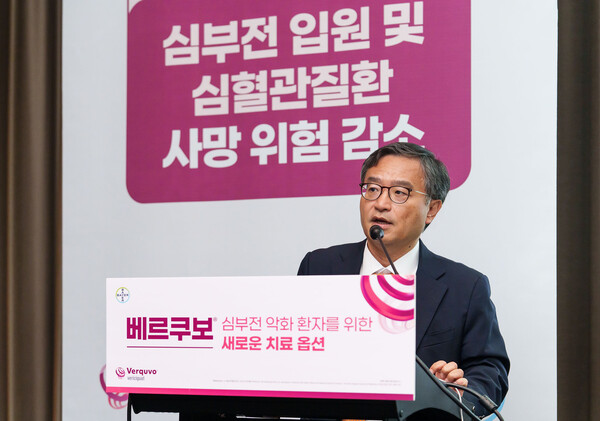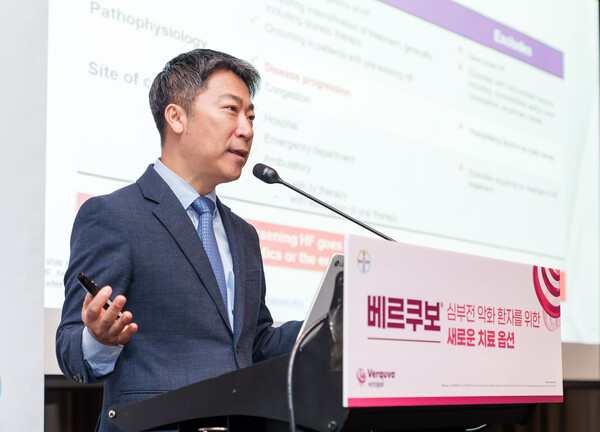Bayer Korea aims to transform the treatment landscape for patients with chronic heart failure with a left ventricular ejection fraction of less than 45 percent with the recent reimbursement of Verquvo (ingredient: vericiguat), the company said Monday.
At the press conference celebrating the drug's reimbursement, Professors Kang Seok-min at Severance Hospital and President of the Korean Society of Heart Failure, and Kim Eung-ju at Korea University Guro Hospital delivered lectures.
The lectures covered topics such as the current status of chronic heart failure disease and its treatment in Korea, a review of the VICTORIA study that played a crucial role in the drug's reimbursement, and the significance of Verquvo's health insurance benefits.

Professor Kang emphasized that the prevalence of heart failure in Korea is steadily increasing due to an aging population, and medical costs are rising due to high readmission and mortality rates.
"The key to treating heart failure is to reduce the risk of hospitalization due to worsening disease," Kang said. "Heart failure is characterized by frequent symptomatic exacerbations, with one in two patients being readmitted to the hospital within 30 days of discharge."
Kang also stressed that repeated hospitalizations for exacerbations are associated with higher mortality rates, and it is paramount to prevent readmissions.
"Patients with chronic heart failure who experience exacerbations despite standard treatment are at high risk of hospitalization and death, and optimal treatment to reduce death and hospitalization rates from heart failure and reduce the burden of medical costs is critical," he said.

During the press conference, Professor Kim also presented key findings from the VICTORIA study, which was the basis for the approval and reimbursement of Verquvo.
"The VICTORIA study was a phase 3 clinical trial of patients with exacerbations of heart failure that were hospitalized for heart failure or were receiving intravenous diuretics on an outpatient basis," he said. "The results showed that Verquvo was associated with an approximately 10 percent lower risk of cardiovascular death or first hospitalization for heart failure than placebo, with an annualized absolute risk reduction of 4.2 percent during a median follow-up of 10.8 months."
Major international guidelines recommend Verquvo for use in patients with heart failure whose symptoms have worsened despite standard treatment, and Korean guidelines recommend it at a higher level than the European Society of Cardiology (ESC), he added.
Kim also stated that it is most noteworthy that Verquvo showed meaningful results in this high-risk population, such as patients with severe symptoms (New York Heart Association class 3-4).
"Verquvo is the world's first soluble guanylate cyclase (sGC) stimulator approved for chronic heart failure and has been recognized as an innovative therapy to meet the unmet need for heart failure treatment," Kim said. "We hope that this coverage will increase access to the treatment for high-risk patients with severe heart failure in Korea and contribute to reducing the socioeconomic burden of the disease."

